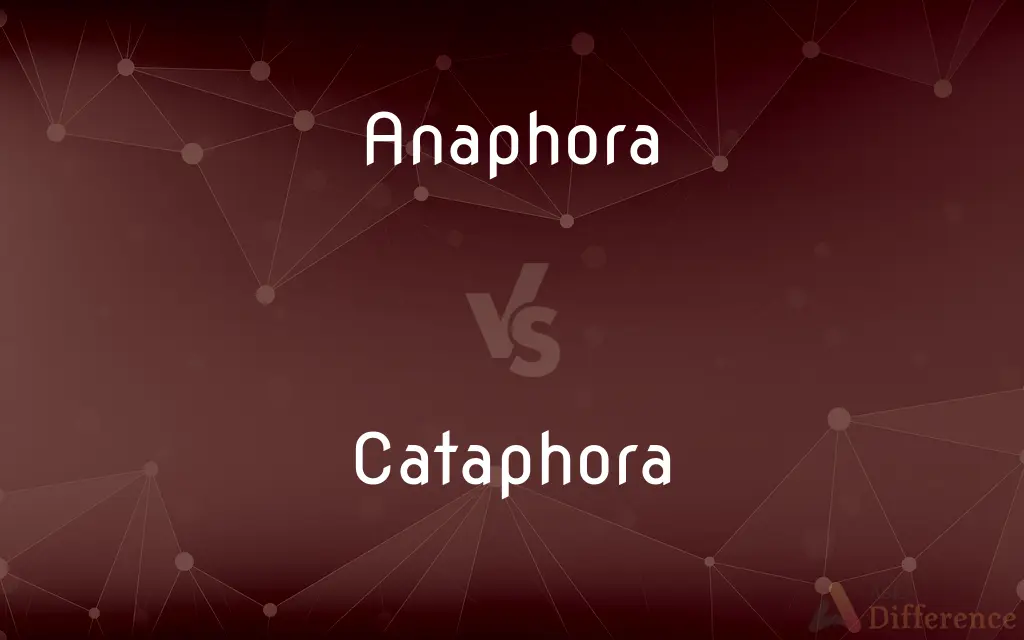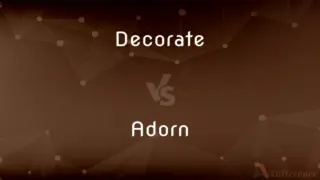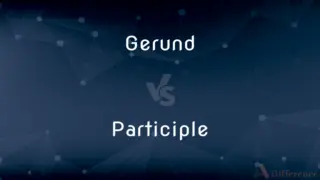Anaphora vs. Cataphora — What's the Difference?
By Tayyaba Rehman — Updated on September 21, 2023
Anaphora refers to a reference to a preceding word or phrase, while Cataphora points ahead to a word or phrase that follows. Both are cohesive devices in linguistics.

Difference Between Anaphora and Cataphora
Table of Contents
ADVERTISEMENT
Key Differences
Anaphora is a linguistic device where a word or phrase refers back to a previous word or phrase in the discourse. Cataphora, in contrast, operates in the opposite direction, where the reference word appears before the word it refers to.
In terms of functionality, Anaphora helps connect sentences or phrases by creating a coherent link with previously mentioned information. Cataphora, though less common, sets an anticipatory tone, making readers or listeners predict or expect subsequent information.
An example of Anaphora might be: "When she arrived at the party, Susan was thrilled." Here, "she" refers back to "Susan." An instance of Cataphora is: "When he finally showed up, John apologized for his tardiness." "He" is clarified later with "John."
In literature, Anaphora is also a rhetorical device where successive lines or sentences start with the same word or phrase. This is distinct from its grammatical function. Cataphora is rarely used as a literary device but can be effective in creating suspense.
While both Anaphora and Cataphora enhance cohesiveness in text, understanding their correct usage is essential for clarity in communication. Mistaking one for the other can lead to confusion for the reader or listener.
ADVERTISEMENT
Comparison Chart
Direction of Reference
Refers back to a previous word or phrase.
Points ahead to a subsequent word or phrase.
Function in Text
Creates coherence by linking to previous info.
Sets anticipatory tone for upcoming info.
Commonality in Usage
More common in everyday language.
Less frequently used.
Example
"Daniel went to the store because he needed milk."
"If you see her, tell Sarah she left her book."
Literary Usage
Used as a rhetorical device.
Rarely used but can create suspense.
Compare with Definitions
Anaphora
A linguistic device that refers back to a previously mentioned word or phrase.
In She loves dancing, and she practices daily, the second she uses anaphora.
Cataphora
A linguistic device where a pronoun or word refers to a subsequent word or phrase.
If you see him, tell Mark he's needed.
Anaphora
A grammatical tool ensuring continuity in a text.
Mark loves skiing. He goes every winter.
Cataphora
A forward-pointing reference in discourse.
Before she starts, Sarah needs a microphone.
Anaphora
A form of cohesion where words reference earlier parts of the text.
Laura bought a cake. She shared it with friends.
Cataphora
A device making readers or listeners predict upcoming information.
If it's there, the treasure will be under the tree.
Anaphora
A backward-pointing reference in discourse.
They wanted to visit Paris because the couple loved art.
Cataphora
A form of cohesion where words anticipate later parts of the text.
When she arrives, give Emily the keys.
Anaphora
(Linguistics) The use of a linguistic unit, such as a pronoun, to refer to the same person or object as another unit, usually a noun. The use of her to refer to the person named by Anne in the sentence Anne asked Edward to pass her the salt is an example of anaphora.
Cataphora
A grammatical tool setting an anticipatory tone.
To answer it, you'll need to solve the riddle first.
Anaphora
(rhetoric) The repetition of a phrase at the beginning of phrases, sentences, or verses, used for emphasis.
They didn't speak. They didn't stand. They didn't even look up when I came in.
Cataphora
In linguistics, cataphora (; from Greek, καταφορά, kataphora, "a downward motion" from κατά, kata, "downwards" and φέρω, pherō, "I carry") is the use of an expression or word that co-refers with a later, more specific, expression in the discourse. The preceding expression, whose meaning is determined or specified by the later expression, may be called a cataphor.
Anaphora
(linguistics) An expression that can refer to virtually any referent, the specific referent being defined by context.
Cataphora
The use of a linguistic unit, such as a pronoun, to refer ahead to another unit, for example, the use of him to refer to John in the sentence Near him, John saw a snake.
Anaphora
(linguistics) An expression that refers to a preceding expression.
Cataphora
The use of a pronoun, or other linguistic unit, before the noun phrase to which it refers, sometimes used for rhetorical effect.
Anaphora
(Christianity) The most solemn part of the Divine Liturgy or the Mass during which the offerings of bread and wine are consecrated as body and blood of Christ
Anaphora
The deliberate repetition of a word or phrase at the beginning of several successive verses, clauses, or paragraphs; for example, "We shall fight on the beaches, we shall fight on the landing grounds, we shall fight in the fields and in the streets, we shall fight in the hills" (Winston S. Churchill).
Anaphora
Plural of anaphor
Anaphora
A repetition of a word or of words at the beginning of two or more successive clauses.
Anaphora
The use of a substitute word, such as a pronoun, in reference to a something already mentioned in a discourse; also, the relation between the substitute word and its antecedent. It is contrasted with cataphora, the use of a pronoun for a word or topic not yet mentioned.
Anaphora
Using a pronoun or other pro-word instead of repeating a word
Anaphora
Repetition of a word or phrase as the beginning of successive clauses
Anaphora
A rhetorical repetition at the beginning of successive lines.
Every day, every night, every moment, I think of you.
Common Curiosities
Is Cataphora common in everyday language?
Cataphora is less common than Anaphora in everyday language.
What does Anaphora refer to in linguistics?
Anaphora refers to a word or phrase that looks back to a previous part of the text.
How is Cataphora different from Anaphora?
Cataphora points forward to a word or phrase that will be mentioned later.
Can Anaphora be used as a literary device?
Yes, in literature, Anaphora is the repetition of a word or phrase at the beginning of successive lines.
Why are Anaphora and Cataphora important in writing?
Both devices enhance cohesion and coherence in texts.
Share Your Discovery

Previous Comparison
Decorate vs. Adorn
Next Comparison
Gerund vs. ParticipleAuthor Spotlight
Written by
Tayyaba RehmanTayyaba Rehman is a distinguished writer, currently serving as a primary contributor to askdifference.com. As a researcher in semantics and etymology, Tayyaba's passion for the complexity of languages and their distinctions has found a perfect home on the platform. Tayyaba delves into the intricacies of language, distinguishing between commonly confused words and phrases, thereby providing clarity for readers worldwide.













































